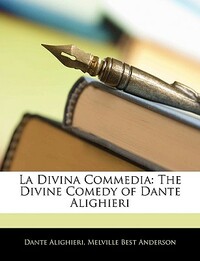You need to sign in or sign up before continuing.
Take a photo of a barcode or cover
307 reviews for:
La Divina Commedia: The Divine Comedy of Dante Alighieri
Melville Best Anderson, Dante Alighieri
307 reviews for:
La Divina Commedia: The Divine Comedy of Dante Alighieri
Melville Best Anderson, Dante Alighieri
Totally beautiful, and makes profound points. The scenes toward the end with Matilda and Beatrice were particularly beautiful. Hollander’s notes help tremendously in following all the inside baseball of medieval Italy.
Mr. Alighieri has done it again. Don’t get me wrong, I have problems with this whole Commedia, but I wanted to take a second and really give Dante a round of applause. I am constantly in awe of how much thought and nuance went into each level of the divine journey, and Purgatory is no exception. I particularly love this edition because there is a fantastic translation + helpful notes! O was sad Virgilio had to leave though! Canto 6 and Canto 7 were died for my favourites. Off to Paradiso.
If Inferno was an exploration of sin and its eternal consequences, then Purgatorio, as its sequel, is an account of how to transcend and move beyond sin. It's rather instructive in tone but I don't think I'd call it didactic. The methods of purging - which include lugging boulders nonstop (pride), having your eyes sewn shut (envy), and running through flames (lust) - are basically impossible to duplicate in life, even if you happen to be a particularly zealous ascetic. I'd say Purgatorio's overall feel is more contemplative. The contrapasso of Inferno was strictly a form of punishment without end. There is no hope in Hell ("abandon hope all ye who enter"), and no love or movement. It is a second death, the place where time has stopped. In Purgatorio, on the other hand, we are asked to consider the relationship between each sin and its corresponding atonement. Although all the souls here are Christians who repented before they died, they are prevented from advancing until they have been purified. What can we do, the canticle asks, to improve ourselves here and now and avoid this stopover that can last centuries?
More on my old blog.
More on my old blog.
reflective
medium-paced
adventurous
challenging
dark
emotional
hopeful
mysterious
reflective
slow-paced
Plot or Character Driven:
Character
Strong character development:
Yes
Loveable characters:
Yes
Diverse cast of characters:
No
Flaws of characters a main focus:
Yes
Read this for school. I loved it, however I was filled with Catholic guilt nearly everyday.
adventurous
reflective
tense
slow-paced
Plot or Character Driven:
Character
Strong character development:
Yes
Loveable characters:
Yes
Diverse cast of characters:
No
Flaws of characters a main focus:
Yes
Essa parte da saga de Dante em que ele enfrenta o purgatório é muita mais lenta e menos interessante que o livro anterior.
As descrições perdem muito da sua beleza e criatividade e dão lugar a discursos intermináveis e personagens que não despertam o interesse.
O livro brilha quando descreve um pouco do purgatório, mas essas partes são minoria no livro, que infelizmente não acompanha o ritmo e a qualidade de seu antecessor.
As descrições perdem muito da sua beleza e criatividade e dão lugar a discursos intermináveis e personagens que não despertam o interesse.
O livro brilha quando descreve um pouco do purgatório, mas essas partes são minoria no livro, que infelizmente não acompanha o ritmo e a qualidade de seu antecessor.
reflective
slow-paced
Plot or Character Driven:
Character
Strong character development:
No
Loveable characters:
No
Diverse cast of characters:
Complicated
Flaws of characters a main focus:
Complicated
I ended up enjoying this part of the Comedy more than Inferno. Inferno was gross and ugly as it's suppose to be. But I started getting tired of the torture after a while. It was unpleasant, which is a good depiction. Purgatorio gets progressively more beautiful as we get to the top of the mountain. I like a good redemption story so it's nice to see the people repenting from their earthly sin, instead of just endless suffering for it.
I didn't try to understand every reference this time. For Inferno I spent a lot of time outside the poem itself to learn about each reference. It was fun but draining. So this time, while I did read a lot of endnotes, I didn't go further than that. Dante uses 3 types of references: biblical, Greek mythology, and modern events(ie Italian history in the 1200-1300 era). I got the biblical ones and occasionally the Greek ones. However, I really didn't care about the Italian references much. There are just so many people Dante talks about and it doesn't feel particularly important to know the details. Basically, I understand Italy had a lot of political unrest, bloodshed, and issues with the Church. The details seem less important.
I switched between two translations also(my physical copy and a pdf I have on my computer). The physical copy is translated by Singleton and was a bit challenging at times to understand but I could mostly follow. If I couldn't, I'd also read the pdf version translated by Ciardi. He writes much more simply and also provided a lot more endnotes and a summary of each poem. But once I got comfortable reading Singleton's, I tended to stick with that version so I didn't have so many endnotes to look through. I could have skipped them in Ciardi'sbut I liked to scan through them and then I ended up spending more time outside of reading the actual poem. I think reading too many endnotes kills the pacing a bit.
Dante is a bit too interested in current events for his poem to be timeless but it is interesting to see how blatant he is in calling people out in the book. Kind of funny at times how he decides who gets to go to hell and who doesn't. Dant does admit in Purgatorio that he struggles with pride. Anyway, I do wish he'd not focused as much on current events. He makes them out to be huge problems that will shake heaven and earth, but being 700 years removed from these now forgotten events makes it a bit hard to take it seriously at times. It is a good reminder though on how powerful the Catholic Church used to be.
Just some thoughts.
The poem was much more beautiful this time around and it's been helping me learn to appreciate poetry more. I'm looking forward to seeing Paradiso!
I didn't try to understand every reference this time. For Inferno I spent a lot of time outside the poem itself to learn about each reference. It was fun but draining. So this time, while I did read a lot of endnotes, I didn't go further than that. Dante uses 3 types of references: biblical, Greek mythology, and modern events(ie Italian history in the 1200-1300 era). I got the biblical ones and occasionally the Greek ones. However, I really didn't care about the Italian references much. There are just so many people Dante talks about and it doesn't feel particularly important to know the details. Basically, I understand Italy had a lot of political unrest, bloodshed, and issues with the Church. The details seem less important.
I switched between two translations also(my physical copy and a pdf I have on my computer). The physical copy is translated by Singleton and was a bit challenging at times to understand but I could mostly follow. If I couldn't, I'd also read the pdf version translated by Ciardi. He writes much more simply and also provided a lot more endnotes and a summary of each poem. But once I got comfortable reading Singleton's, I tended to stick with that version so I didn't have so many endnotes to look through. I could have skipped them in Ciardi'sbut I liked to scan through them and then I ended up spending more time outside of reading the actual poem. I think reading too many endnotes kills the pacing a bit.
Dante is a bit too interested in current events for his poem to be timeless but it is interesting to see how blatant he is in calling people out in the book. Kind of funny at times how he decides who gets to go to hell and who doesn't. Dant does admit in Purgatorio that he struggles with pride. Anyway, I do wish he'd not focused as much on current events. He makes them out to be huge problems that will shake heaven and earth, but being 700 years removed from these now forgotten events makes it a bit hard to take it seriously at times. It is a good reminder though on how powerful the Catholic Church used to be.
Just some thoughts.
The poem was much more beautiful this time around and it's been helping me learn to appreciate poetry more. I'm looking forward to seeing Paradiso!
Purgatorio is *criminally underrated* Dante. I think it's better than Inferno. I certainly read it faster. Again, Ciardi's notes are invaluable, especially near the end with confusing allegories. If you read Inferno and liked it, but not enough to continue, this is your cue that the journey to come is absolutely worth it! Moving on to Paradiso now, but I will really miss Virgil. Still, looking forward to more Beatrice!





